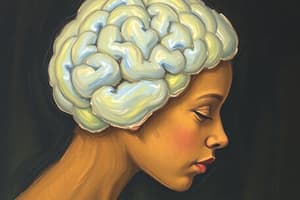Podcast
Questions and Answers
What physiological effect of alcohol consumption can lead to liver damage over time?
What physiological effect of alcohol consumption can lead to liver damage over time?
- Stimulation of stress hormone release (correct)
- Release of acetaldehyde
- Decreased blood glucose levels
- Alteration of communication between neurons
How does alcohol consumption affect blood glucose levels, leading to reduced brain activity?
How does alcohol consumption affect blood glucose levels, leading to reduced brain activity?
- Causes hyperglycemia
- No effect on blood glucose levels
- Increases blood glucose levels
- Leads to hypoglycemia (correct)
Which organ is primarily responsible for processing alcohol in the body?
Which organ is primarily responsible for processing alcohol in the body?
- Liver (correct)
- Brain
- Heart
- Stomach
What can be a common cause of individuals experiencing a state of being 'dazed' other than alcohol consumption?
What can be a common cause of individuals experiencing a state of being 'dazed' other than alcohol consumption?
Which of the following is a consequence of ethanol binding to GABA receptors in the brain?
Which of the following is a consequence of ethanol binding to GABA receptors in the brain?
What physiological process produces acetaldehyde and triggers inflammation in the liver during alcohol metabolism?
What physiological process produces acetaldehyde and triggers inflammation in the liver during alcohol metabolism?
How does alcohol consumption affect memory during a dazed state?
How does alcohol consumption affect memory during a dazed state?
What impact does being in a dazed state have on attention?
What impact does being in a dazed state have on attention?
How does alcohol consumption affect problem-solving skills during a dazed state?
How does alcohol consumption affect problem-solving skills during a dazed state?
What impact does being dazed have on reasoning skills?
What impact does being dazed have on reasoning skills?
Why is it important to understand the consequences of a dazed state on cognitive function?
Why is it important to understand the consequences of a dazed state on cognitive function?
In what way does a dazed state affect cognitive functions like problem solving and reasoning?
In what way does a dazed state affect cognitive functions like problem solving and reasoning?
Flashcards are hidden until you start studying
Study Notes
Effects of Daze on Cognitive Function
The term 'Daze' is often used colloquially to describe feeling disoriented or confused due to alcohol consumption, lack of sleep, or other factors. While the word itself may conjure up images of stumbling drunkenness, it can also be caused by a variety of physical and mental conditions. Understanding how these states impact cognitive function requires examining the physiological processes involved and their consequences.
Physiological Processes Involved in Daze
Alcohol Consumption
When someone consumes alcohol, it has several effects on various parts of the body. It primarily affects three organs: the liver, brain, and stomach. Alcohol is processed in the liver, where it undergoes metabolism. This process produces acetaldehyde, which triggers inflammation in the liver. Additionally, alcohol stimulates the release of stress hormones like cortisol, which can lead to liver damage over time.
In the brain, ethanol binds to GABA receptors, altering communication between neurons. Ethanol also decreases blood glucose levels, leading to hypoglycemia and reduced brain activity. These combined effects can result in feelings of dizziness, confusion, and disorientation.
Other Factors
There are numerous reasons why individuals might experience a state of being 'dazed'. Some common causes include sleep deprivation, head injuries, dehydration, concussions, or even neurological disorders such as multiple sclerosis, among others. Any condition that disrupts normal neural processing can potentially cause a dazed state.
Consequences of Daze on Cognitive Function
Cognitive functions refer to intellectual abilities such as memory, attention, perception, reasoning, and problem solving. When someone experiences a dazed state, their cognitive performance can be significantly impaired. This can manifest in various ways:
Memory Impairment
Alcohol consumption interferes with short-term potentiated synaptic transmission and learning, resulting in both short- and long-term memory impairments. A study found that participants who consumed alcohol before testing had reduced recall accuracy compared to those who did not drink. Additionally, chronic alcohol abuse leads to permanent damage to the hippocampus, further contributing to memory loss.
Attention Deficit
A dazed state can make it difficult for an individual to focus on tasks requiring sustained attention. For example, a study tested reaction times while intoxicated versus sober subjects and found that reaction times were slower after alcohol consumption compared to when sober. This impaired responsiveness can lead to safety concerns, such as driving under the influence of alcohol.
Problem Solving
Cognitive functions like problem solving are heavily reliant on mental resources. Alcohol consumption reduces the efficiency of these processes, leading to difficulty in processing information and making decisions. Studies have shown that even moderate levels of alcohol can impair problem-solving skills, particularly those involving abstract reasoning and spatial abilities.
Reasoning
The impairment in cognitive functions also extends to reasoning skills. Alcohol consumption has been shown to reduce the efficiency of the brain's decision-making process. As mentioned earlier, alcohol affects GABA receptors, leading to disruptions in communication between neurons. This can result in difficulties making logical decisions and solving complex problems.
In conclusion, experiencing a state of being dazed can have significant consequences on cognitive function. These effects are particularly prevalent when caused by alcohol consumption but can also arise from various other physical or mental conditions. It is crucial to understand these impacts to ensure safety and maintain optimal cognitive performance.
Studying That Suits You
Use AI to generate personalized quizzes and flashcards to suit your learning preferences.



